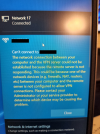thecomputerguy
Well-Known Member
- Reaction score
- 1,435
I have a client who has a USG. There is one remote user, and they were getting tired of the lag using LogMeIn so I said, "Hey! No problem! We'll just setup L2TP in the USG! then you'll be able to access the server share directly! And! I'll have you RDP into your workstation at the office so you can access Quickbooks!"
After some fiddling around I was able to get the L2TP connection up, using all basic settings found in this video:
Essentially....
1.) Enable Radius (w/ Secret Passcode)
2.) Create Radius user
3.) Create remote user VPN (w/ Pre-Shared Key)
Added the AssumeUDPEncapsulationContextOnSendRule registry edit and off we go.
Everything was working great, she was super happy with everything until it just stopped working, and it has stopped working multiple times, and the only way I am able to resolve it is to login to the USG, delete her Radius user, turn the Radius server off, delete the Remote User VPN and then set it all back up again, with identical settings. Make no changes to the VPN client, and then bam it connects again (for who knows how long).
This morning she texted me she couldn't connect with this error (AGAIN):

I get into my office and I can connect fine with no issue, so I tell her there must be something wrong with her network and I'd come out with my laptop after verifying I can connect to the VPN from my office, then try to connect to the VPN with my laptop on your network.
I go out there, my laptop also can't connect, so I'm thinking ok well it's definitely something with the network. We reboot everything, still no go. I get back to my office and now my laptop and my desktop can't connect to the VPN. WTF?
So I delete her Radius user, turn the Radius server off, delete the Remote User VPN and then set it all back up again, with identical settings. Make no changes to the VPN client, and then bam everyone can connect again.
I have verified that re-creating the Radius user is not enough to fix the issue, but I have not been able to verify if deleting the user and then turning off the radius server then back on again fixes it. I have always gone the extra step of deleting the Remote User VPN as well.
After some fiddling around I was able to get the L2TP connection up, using all basic settings found in this video:
Essentially....
1.) Enable Radius (w/ Secret Passcode)
2.) Create Radius user
3.) Create remote user VPN (w/ Pre-Shared Key)
Added the AssumeUDPEncapsulationContextOnSendRule registry edit and off we go.
Everything was working great, she was super happy with everything until it just stopped working, and it has stopped working multiple times, and the only way I am able to resolve it is to login to the USG, delete her Radius user, turn the Radius server off, delete the Remote User VPN and then set it all back up again, with identical settings. Make no changes to the VPN client, and then bam it connects again (for who knows how long).
This morning she texted me she couldn't connect with this error (AGAIN):

I get into my office and I can connect fine with no issue, so I tell her there must be something wrong with her network and I'd come out with my laptop after verifying I can connect to the VPN from my office, then try to connect to the VPN with my laptop on your network.
I go out there, my laptop also can't connect, so I'm thinking ok well it's definitely something with the network. We reboot everything, still no go. I get back to my office and now my laptop and my desktop can't connect to the VPN. WTF?
So I delete her Radius user, turn the Radius server off, delete the Remote User VPN and then set it all back up again, with identical settings. Make no changes to the VPN client, and then bam everyone can connect again.
I have verified that re-creating the Radius user is not enough to fix the issue, but I have not been able to verify if deleting the user and then turning off the radius server then back on again fixes it. I have always gone the extra step of deleting the Remote User VPN as well.
